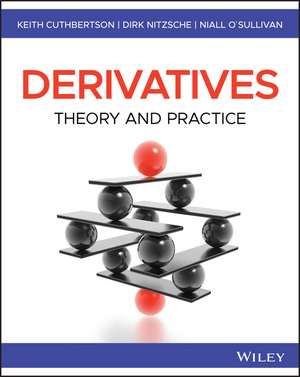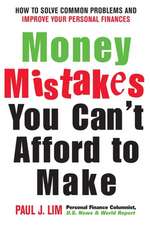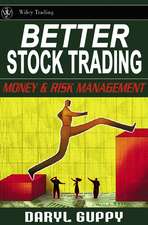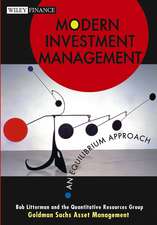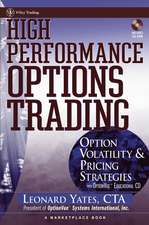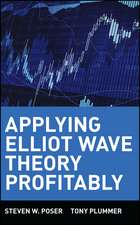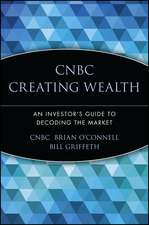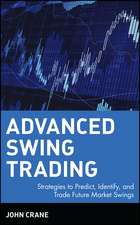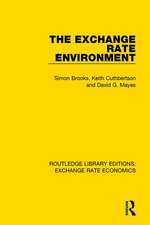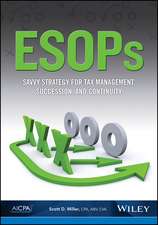Derivatives – Theory and Practice 2e
Autor K Cuthbertsonen Limba Engleză Paperback – 31 oct 2019
Preț: 553.78 lei
Nou
Puncte Express: 831
Preț estimativ în valută:
105.96€ • 110.93$ • 87.68£
105.96€ • 110.93$ • 87.68£
Carte tipărită la comandă
Livrare economică 05-19 aprilie
Preluare comenzi: 021 569.72.76
Specificații
ISBN-13: 9781119595595
ISBN-10: 1119595592
Pagini: 912
Dimensiuni: 190 x 235 x 48 mm
Greutate: 1.63 kg
Ediția:1st Edition
Editura: Wiley
Locul publicării:Chichester, United Kingdom
ISBN-10: 1119595592
Pagini: 912
Dimensiuni: 190 x 235 x 48 mm
Greutate: 1.63 kg
Ediția:1st Edition
Editura: Wiley
Locul publicării:Chichester, United Kingdom
Notă biografică
KEITH CUTHBERTSON is professor of Finance at CASS Business School, City, University of London. He has worked at H.M.Treasury, Bank of England, National Institute of Economic and Social Research NIESR and at business schools at Imperial College London and the University of Newcastle.
DIRK NITZSCHE is Senior Lecturer in Finance, Course Director for the Quants Masters Programmes, and Associate Dean for International Relations at CASS Business School, City, University of London.
NIALL O' SULLIVAN is professor of economics at Cork University Business School, University College Cork and former adjunct lecturer at Dublin City University Business School.
Cuprins
About the Authors xxvii
About the Companion Site xxix
Preface xxxi
Chapter 1 Derivative Securities 1
1.1 Forwards and Futures 2
1.2 Options 7
1.3 Swaps 14
1.4 Hedging, Speculation, and Arbitrage 16
1.5 Short-Selling 18
1.6 Summary 20
Exercises 21
Part I Forwards and Futures 23
Chapter 2 Futures Markets 25
2.1 Trading on Futures Markets 25
2.2 Futures Exchanges and Traders 29
2.3 Margins and Marking-to-Market 30
2.4 Summary 36
Exercises 36
Chapter 3 Forward and Futures Prices 39
3.1 Pricing Forward Contracts 39
3.2 Dividends, Storage Costs, and Convenience Yield 46
3.3 Commodity Futures 49
3.4 Value of a Forward Contract 53
3.5 Summary 57
Exercises 57
Chapter 4 Futures: Hedging and Speculation 59
4.1 Hedging Using Futures 59
4.2 Novel Futures Contracts 67
4.3 Speculation 70
4.4 Summary 72
Exercises 73
Chapter 5 Index Futures 75
5.1 Stock Index Futures (SIF) 76
5.2 Index Arbitrage 78
5.3 Hedging 81
5.4 Tailing the Hedge 88
5.5 Summary 89
Appendix 5: Hedge Ratios 89
Exercises 93
Chapter 6 Strategies: Stock Index Futures 95
6.1 Underpriced Stocks: Hedging Market Risk 95
6.2 Overpriced Stocks: Hedging Market Risk 98
6.3 Market-neutral Hedge Fund 100
6.4 Long-Short Hedge Fund 101
6.5 Changing Stock Market Exposure 104
6.6 Merger Arbitrage 106
6.7 Summary 109
Appendix 6.A: Stock Picking and Market Risk 110
Appendix 6.B: Market Timing 112
Appendix 6.C: Hedging: Long-Short Portfolio 114
Appendix 6.D: Merger Arbitrage and Hedging 116
Exercises 117
Chapter 7 Currency Forwards and Futures 119
7.1 FX-Futures Contracts 120
7.2 Pricing FX-Forward Contracts 123
7.3 Pricing FX-Futures Contracts 126
7.4 Hedging and Speculation: Forwards 127
7.5 Hedging and Speculation: Futures 129
7.6 Summary 132
Appendix 7: Hedging Using FX-Futures 133
Exercises 135
Part II Fixed Income: Cash Markets 137
Chapter 8 Interest Rates 139
8.1 LIBOR, Repos, Fed Funds, and OIS Rates 139
8.2 Day-Count Conventions 141
8.3 Forward Rates 146
8.4 Forward Rate Agreements (FRAs) 150
8.5 Summary 154
Exercises 154
Chapter 9 Bond Markets 157
9.1 Prices, Yields, and Return 158
9.2 Pricing Coupon Bonds 165
9.3 Summary 168
Exercises 169
Chapter 10 Bonds: Duration and Convexity 171
10.1 Yield Curve 171
10.2 Duration and Convexity 173
10.3 Summary 178
Appendix 10: Duration and Convexity 179
Exercises 181
Part III Fixed Income Futures Contracts 183
Chapter 11 Interest Rate Futures 185
11.1 Three-month Eurodollar Futures Contract 186
11.2 Sterling 3-month Futures Contract 188
11.3 T-bill Futures 188
11.4 Futures Price and Forward Rates 189
11.5 Pricing Interest Rate Futures 190
11.6 Arbitrage: Implied Repo Rate 193
11.7 Speculation 195
11.8 Spread Trades 196
11.9 Summary 199
Appendix 11.A: Futures Prices and Interest Rates 200
Exercises 203
Chapter 12 Hedging with Interest Rate Futures 205
12.1 Number of Futures Contracts 206
12.2 Different Types of Hedge 210
12.3 Hedging: T-bill and Eurodollar Futures 214
12.4 Eurodollar Stack Hedge 217
12.5 Summary 221
Appendix 12: Hedge Ratios 222
Exercises 224
Chapter 13 T-bond Futures 227
13.1 Contract Specifications 228
13.2 Conversion Factor and Cheapest-to-Deliver 230
13.3 Hedging Using T-Bonds 234
13.4 Hedging: Further Issues 235
13.5 Market Timing 238
13.6 Wild Card Play 239
13.7 Pricing T-bond Futures 240
13.8 T-bond Futures Spreads 244
13.9 Summary 247
Appendix 13.A: Hedging: Duration and Market Timing 248
Appendix 13.B: Implied Repo Rate and Arbitrage 250
Exercises 251
Part IV Options 253
Chapter 14 Options Markets 255
14.1 Market Organisation 255
14.2 Call Options 261
14.3 Put Options 268
14.4 Intrinsic Value and Time Value 273
14.5 Summary 276
Exercises 277
Chapter 15 Uses of Options 279
15.1 Protective Put 279
15.2 Put-Call Parity: European Options 282
15.3 Guaranteed Bond 283
15.4 Other Options 286
15.5 Summary 288
Exercises 289
Chapter 16 Black-Scholes Model 291
16.1 Determinants of Option Prices 291
16.2 Black-Scholes 296
16.3 Are Stocks Less Risky in the Long Run? 303
16.4 Delta Hedging 306
16.5 Implied Volatility 308
16.6 Summary 311
Appendix 16: Price Bounds on European Options 312
Exercises 313
Chapter 17 Option Strategies 315
17.1 Synthetic Securities 316
17.2 Bull and Bear Spreads 320
17.3 Straddle, Strangle, Butterfly, and Condor 324
17.4 Horizontal (Time, Calendar) Spreads 333
17.5 Summary 335
Exercises 335
Chapter 18 Stock Options and Stock Index Options 337
18.1 Options on Stocks 337
18.2 Stock Index Options (SIO) 342
18.3 Summary 345
Appendix 18.A: Static Hedge: Index Puts 345
Appendix 18.B: Dynamic Delta Hedge 346
Exercises 346
Chapter 19 Foreign Currency Options 349
19.1 Contract Specifications 349
19.2 Speculation 350
19.3 Hedging Foreign Currency Exposure 353
19.4 Other Currency Options 358
19.5 Summary 358
Exercises 359
Chapter 20 Options on Futures 363
20.1 Market Conventions 363
20.2 Price Bounds on European Futures Options 366
20.3 Trading Strategies 367
20.4 Summary 370
Exercises 371
Part V Options Pricing 373
Chapter 21 BOPM: Introduction 375
21.1 One-Period BOPM 375
21.2 Risk-neutral Valuation 379
21.3 Determinants of Call Premium 382
21.4 Pricing a European Put Option 383
21.5 Summary 384
Appendix 21: No-arbitrage Conditions 385
Exercises 386
Chapter 22 BOPM: Implementation 389
22.1 Generalising the BOPM 390
22.2 Replication Portfolio 393
22.3 BOPM to Black-Scholes 396
22.4 Summary 398
Appendix 22: Delta Hedging and Arbitrage 399
Exercises 402
Chapter 23 BOPM: Extensions 405
23.1 American Options 405
23.2 Options on Other Underlying Assets 407
23.3 Options on Futures Contracts 409
23.4 Options on Dividend-paying Stocks 412
23.5 Summary 414
Appendix 23: BOPM and Risk-neutral Valuation 415
Exercises 419
Chapter 24 Analysis of Black-Scholes 421
24.1 Volatility 421
24.2 Testing Black-Scholes 425
24.3 Limitations of Black-Scholes 428
24.4 Summary 431
Exercises 432
Chapter 25 Pricing European Options 435
25.1 What do N(d1) and N(d2) Represent? 435
25.2 European Options: Dividend Paying Stocks 436
25.3 Foreign Currency and Futures Options 437
25.4 Put-Call Parity 440
25.5 Summary 443
Exercises 444
Chapter 26 Pricing Options: Monte Carlo Simulation 447
26.1 Brownian Motion: Parallel Universe 447
26.2 Pricing a European Call 449
26.3 Variance Reduction Methods 454
26.4 The Greeks 455
26.5 Multiple Stochastic Factors 456
26.6 Path-dependent Options 459
26.7 Summary 460
Appendix 26: MCS, Several Stochastic Variables 461
Exercises 464
Part VI The Greeks 467
Chapter 27 Delta Hedging 469
27.1 Delta 469
27.2 Dynamic Delta Hedging 473
27.3 Summary 481
Exercises 481
Chapter 28 The Greeks 483
28.1 Different Greeks 483
28.2 Hedging with the Greeks 491
28.3 Greeks and the BOPM 496
28.4 Summary 498
Appendix 28: Black-Scholes and the Greeks 499
Exercises 502
Chapter 29 Portfolio Insurance 503
29.1 Static Hedge 504
29.2 Dynamic Portfolio Insurance 507
29.3 Summary 513
Exercises 514
Part VII Advanced Options 517
Chapter 30 Other Options 519
30.1 Corporate Equity and Debt 519
30.2 Warrants 522
30.3 Equity Collar 524
30.4 Summary 526
Exercises 527
Chapter 31 Exotic Options 529
31.1 Three-period BOPM 530
31.2 Asian Options 531
31.3 Other Exotics: Lookbacks, Barrier, Compound, and Chooser 535
31.4 Summary 542
Exercises 543
Chapter 32 Energy and Weather Derivatives 545
32.1 Energy Contracts 546
32.2 Hedging with Energy Futures 549
32.3 Energy Swaps 552
32.4 Weather Derivatives 557
32.5 Reinsurance and CAT Bonds 562
32.6 Summary 562
Exercises 563
Part VIII Swaps 567
Chapter 33 Interest Rate Swaps 569
33.1 Using Interest Rate Swaps 571
33.2 Cash Flows in a Swap 573
33.3 Settlement and Price Quotes 575
33.4 Terminating a Swap 577
33.5 Comparative Advantage 577
33.6 Summary 581
Appendix 33: Comparative Advantage with Swap Dealer 581
Exercises 583
Chapter 34 Pricing Interest Rate Swaps 585
34.1 Cash Flows in a Swap 586
34.2 Floating Rate Note (FRN) 587
34.3 Pricing a Swap: Short Method 589
34.4 Pricing a Swap: Forward Rate Method 591
34.5 Market Value of a Swap 593
34.6 Swap Delta and PVBP 596
34.7 Summary 597
Appendix 34: Value of an FRN Using Arbitrage 597
Exercises 598
Chapter 35 Other Interest Rate Swaps 601
35.1 Swap Deals 601
35.2 Pricing Non-standard Swaps 603
35.3 Hedging Interest Rate Swaps 608
35.4 Credit Risk 614
35.5 Summary 615
Exercises 616
Chapter 36 Currency Swaps 617
36.1 Uses 617
36.2 Pricing a Fixed-Fixed Currency Swap 620
36.3 Valuing a Fixed-Fixed Currency Swap 622
36.4 Summary 625
Appendix 36.A: Pricing a Currency Swap 626
Appendix 36.B: Valuation of a Currency Swap 628
Exercises 629
Chapter 37 Equity Swaps 631
37.1 Equity-for-LIBOR: Fixed Notional Principal 632
37.2 Unhedged Cross-currency Equity Swap 634
37.3 Hedged Cross-currency Equity Swap 635
37.4 Pricing Equity Swaps 636
37.5 Summary 643
Appendix 37: Valuation of Equity-for-LIBOR Swap 643
Exercises 644
Part IX Fixed Income Derivatives 647
Chapter 38 T-Bond Option, Caps, Floors and Collar 649
38.1 Options on T-Bonds and Eurodollars 649
38.2 Caplets and Floorlets 650
38.3 Interest Rate Cap 655
38.4 Interest Rate Floor 657
38.5 Interest Rate Collar 658
38.6 Summary 661
Exercises 662
Chapter 39 Swaptions, Forward Swaps, and MBS 665
39.1 Swaptions 665
39.2 Forward Swaps 668
39.3 Mortgage-backed Securities (MBS) 670
39.4 Hedging Fixed Income Derivatives 675
39.5 Summary 677
Exercises 678
Chapter 40 Pricing Fixed Income Options: Black's Model and MCS 681
40.1 Black's Model: European Options 682
40.2 Pricing a Caplet Using MCS 684
40.3 European Swaption: Black's Model 685
40.4 Summary 688
Exercises 688
Chapter 41 Pricing Fixed Income Derivatives: BOPM 691
41.1 No-arbitrage Approach: BOPM 692
41.2 Pricing a Coupon Bond 697
41.3 Pricing Options 697
41.4 Pricing a Callable Bond 700
41.5 Pricing Caps 701
41.6 Pricing FRAs 702
41.7 Pricing a Swaption 704
41.8 Pricing FRNs with Embedded Options 705
41.9 More Lattices 708
41.10 Summary 709
Exercises 710
Part X Credit Derivatives 713
Chapter 42 Credit Default Swaps (CDS) 715
42.1 Credit Risk and CDS 716
42.2 Speculation with CDS 717
42.3 Contract Details 719
42.4 Pricing and Valuation 720
42.5 Bond Yields and the CDS Spread 725
42.6 Credit Indices and other CDS Contracts 727
42.7 Derivatives on the CDS Spread 727
42.8 Summary 729
Exercises 730
Chapter 43 Securitisation, ABSs and CDOs 731
43.1 ABSs and ABS-CDOs 731
43.2 Credit Enhancement 736
43.3 Losses on ABSs and ABS-CDOs 738
43.4 Sub-prime Crisis 2007-8 740
43.5 Synthetic CDOs 743
43.6 Single Tranche Trading 744
43.7 Total Return Swap 746
43.8 Summary 747
Exercises 748
Part XI Market Risk 749
Chapter 44 Value at Risk 751
44.1 Introduction 751
44.2 Value at Risk (VaR) 752
44.3 Forecasting Volatility 761
44.4 Backtesting 763
44.5 Capital Adequacy 766
44.6 Summary 767
Exercises 768
Chapter 45 VaR: Other Portfolios 769
45.1 Single Index Model 769
45.2 VaR for Coupon Bonds 773
45.3 VaR: Options 777
45.4 Summary 779
Appendix 45.A: VaR for Foreign Assets 779
Appendix 45.B: Single Index Model (SIM) 780
Appendix 45.C: Cash Flow Mapping 782
Exercises 784
Chapter 46 VaR: Alternative Measures 787
46.1 Historical Simulation 787
46.2 Bootstrapping 792
46.3 Monte Carlo Simulation 795
46.4 Alternative Methods 799
46.5 Summary 803
Exercises 804
Part XII Price Dynamics 807
Chapter 47 Asset Price Dynamics 809
47.1 Stochastic Processes 810
47.2 Geometric Brownian Motion (GBM) and Ito's Lemma 812
47.3 Distribution of Log Stock Price and Stock Price 814
47.4 Summary 817
Appendix 47: Ito's Lemma 817
Exercises 818
Chapter 48 Black-Scholes PDE 821
48.1 Risk-Neutral Valuation and Black-Scholes PDE 821
48.2 Finite Difference Methods 826
48.3 Summary 830
Appendix 48: Derivation of Black-Scholes PDE 830
Exercises 833
Chapter 49 Equilibrium Models: Term Structure 835
49.1 Risk-neutral Valuation 836
49.2 Models of the Short-Rate 837
49.3 Pricing Using Continuous Time Models 839
49.4 Bond Prices and Derivative Prices 841
49.5 Summary 843
Exercises 844
Glossary 845
Bibliography 867
Author Index 871
Subject Index 873
